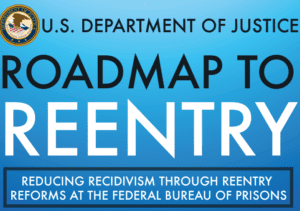U.S. Attorney General Lynch Emphasizes Access to IDs for People Leaving Prisons in #ReentryWeek Announcement
 Kicking off the country’s first-ever National #ReentryWeek, U.S. Attorney General Loretta Lynch (left) invited states to partner with the U.S. Department of Justice (DOJ) in helping people returning home from federal prisons to “turn the page” on their criminal justice involvement.
Kicking off the country’s first-ever National #ReentryWeek, U.S. Attorney General Loretta Lynch (left) invited states to partner with the U.S. Department of Justice (DOJ) in helping people returning home from federal prisons to “turn the page” on their criminal justice involvement.
In letters to all 50 governors, Lynch urged state governments to work with the DOJ to enable people leaving federal prisons to use their Bureau of Prisons inmate ID card and official release documentation to secure state-issued IDs. This step, she said, would “eliminate one of the most common and most harmful barriers to reentry across the United States,” and would help to standardize the process for providing people returning to the community after incarceration with identification.
“Even more important is the message that such a program would send to returning citizens: that they are welcome back into society…and that they can now, quite literally, exchange their old identity as a federal inmate for a fresh start,” said Lynch at a National Reentry Week event at the Philadelphia Housing Authority’s Raymond Rosen Manor on Monday.
To help educate state and local policymakers, the National Reentry Resource Center released a fact sheet this week highlighting the impact of, and models for, issuing state identification for people leaving prisons and jails across the country.
 Lynch also announced the release of the DOJ’s Roadmap to Reentry, which identifies five evidence-based principles guiding federal efforts to improve the correctional practices and programs that govern the lives of people who will reenter society after incarceration. Those federal reforms will affect people from the day they begin incarceration through their first months after release.
Lynch also announced the release of the DOJ’s Roadmap to Reentry, which identifies five evidence-based principles guiding federal efforts to improve the correctional practices and programs that govern the lives of people who will reenter society after incarceration. Those federal reforms will affect people from the day they begin incarceration through their first months after release.
“Our hope is that by expanding our approach to reentry and demonstrating what is possible at the federal level, we will ensure that our facilities support the needs of returning citizens and advance the continuing evolution of modern correctional practices, leading to safer neighborhoods and brighter futures at every level,” Lynch said.
U.S. Secretary of Housing and Urban Development Julian Castro also unveiled the Juvenile Reentry Assistance Program on Monday, which will help people under the age of 25 to clean their records, while President Obama honored the White House Champions of Change—leaders who have helped people involved with the justice system overcome barriers to employment—on Wednesday.
Lynch stressed that the Obama administration’s efforts to improve outcomes for people reentering society from incarceration will extend far beyond this week.
“Reentry isn’t just a ‘one day’ or ‘one week’ idea,” she said. “It is something that demands sustained commitment over time and that must be a part of our core corrections and rehabilitation mission.”
In response to growing calls for police reform in New Jersey, particularly following the shootings of Najee Seabrooks…
Read More Three Things to Know About New Jersey’s Groundbreaking Community Response Legislation
Three Things to Know About New Jersey’s Groundbreaking Community Response Legislation
In response to growing calls for police reform in New Jersey, particularly…
Read More Apply Now: Join a Learning Community for Community and Crisis Response Teams to Improve Responses to Youth
Read More
Apply Now: Join a Learning Community for Community and Crisis Response Teams to Improve Responses to Youth
Read More
 Apply Now: Join a Learning Community Focused on Substance Use and Overdose Community Response Programs
Read More
Apply Now: Join a Learning Community Focused on Substance Use and Overdose Community Response Programs
Read More













